Lunch Panels
Meeting with EiCs • 4 October 2021 • 12 – 1 PM ET
 Dr. Paolo Bonato, Associate Professor, Department of Physical Medicine and Rehabilitation, Harvard Medical School, USA
Dr. Paolo Bonato, Associate Professor, Department of Physical Medicine and Rehabilitation, Harvard Medical School, USA
Talk Title: Could We Do Better if We Relied on mHealth Technology in the Fight Against COVID-19?
Abstract: A significant body of work shows that mHealth technology could provide effective screening tools to estimate the probability of infection in the population at large. In this talk, examples of the vast literature related to this topic will be presented and discussed. Pros and cons of several mHealth technologies will be examined ranging from wearable technology, voice detection, digital contact tracing, and point-of-care technology designed to facilitate the detection of COVID infections. We will argue that, when combined with data collected in the field and with the use of models of the pandemic, mHealth technology could provide an effective tool to avoid and manage potential outbreaks. Finally, we will discuss lessons learned in our attempts to deploy mHealth technology to address the COVID-19 pandemic and how they will allow us to prepare better for future outbreaks and future pandemics.
Bio-sketch: Paolo Bonato, Ph.D., is an Associate Professor in the Department of Physical Medicine and Rehabilitation at Harvard Medical School. He holds adjunct appointments at the MGH Institute of Health Professions, the Wyss Institute for Biologically Inspired Engineering, and Boston University College of Health & Rehabilitation Sciences. He has held Adjunct Faculty positions at MIT, the University of Ireland Galway, and the University of Melbourne. His research work is focused on the development of rehabilitation technologies with special emphasis on wearable technology and robotics. Dr. Bonato currently serves as the Founding Editor-in-Chief of the IEEE Open Journal of Engineering in Medicine and Biology. He served as IEEE EMBS Vice President for Publications (2013-2016). He received the M.S. degree in electrical engineering from Politecnico di Torino, Turin, Italy in 1989 and the Ph.D. degree in biomedical engineering from Universita` di Roma “La Sapienza” in 1995.
 Dr. Dimitrios I. Fotiadis, FIEEE, FEAMBES, FIAMBE Professor of Biomedical Engineering, Head of the Unit of Medical Technology and Intelligent Information Systems, University of Ioannina, Editor in Chief, IEEE Journal of Biomedical and Health Informatics, Greece
Dr. Dimitrios I. Fotiadis, FIEEE, FEAMBES, FIAMBE Professor of Biomedical Engineering, Head of the Unit of Medical Technology and Intelligent Information Systems, University of Ioannina, Editor in Chief, IEEE Journal of Biomedical and Health Informatics, Greece
Talk Title: Towards the Development of Explainable AI Models to Address the Clinical Unmet Needs in COVID-19
Abstract: The severe pandemic of the new millennium by the name of coronavirus disease 2019 (COVID-19) is consistently yielding grievous impacts in the global healthcare system. Although several attempts have been made to shed light on the pathological mechanisms of the disease, the lack of explainable AI models for COVID-19 progression and treatment remains an unmet need. Here, we present a straightforward pipeline that focuses on the development of explainable AI models to address the COVID-19 unmet needs including the development of prediction models of ICU admission and mortality, as well as, the detection of biomarkers for disease progression and the suggestion of targeted therapeutic treatments. To do so, we utilize Self Organizing Maps (SOMs) to cluster patients with common disease profiles across multiple timepoints upon admission to the hospital. Then, we extract prominent features that significantly deviate among the clusters and use them as input in boosting algorithms and meta estimators to develop AI models for ICU admission and mortality. Towards this direction, Dynamic Bayesian networks (DBNs) are used to identify prominent features across multiple timepoints through association analysis and further enhance the performance of the AI models. Shapley explainability analysis is finally applied to enhance the explainability of the AI models by quantifying the positive or negative impact of the features on the performance of the AI models. Our results are expected to promote research in COVID-19 through the detection of biomarkers for COVID-19 progression and the suggestion of targeted therapeutic treatments to improve the healthcare services in the global healthcare crisis.
Bio-sketch: Prof. Dimitrios I. Fotiadis received the Diploma degree in chemical engineering from the National Technical University of Athens, Athens, Greece, and a Ph.D. degree in chemical engineering and materials science from the University of Minnesota, Minneapolis. He is currently a Professor of Biomedical Engineering in the Department of Materials Science and Engineering, University of Ioannina, Ioannina, Greece, where he is also the Director of the Unit of Medical Technology and Intelligent Information Systems, and is also an Affiliated Member of Foundation for Research and Technology Hellas, Institute of Molecular Biology and Biotechnology, Dept. of Biomedical Research. He was a Visiting Researcher at the RWTH, Aachen, Germany, and the Massachusetts Institute of Technology, Boston. He has coordinated and participated in more than 250 R&D funded projects (in FP6, FP7, H2020, and national Projects), being the coordinator (e.g. INSILC, TAXINOMISIS, HOLOBALANCE, CARDIOCARE, etc.) and Technical coordinator (e.g. SMARTOOL, KARDIATOOL, TO_AITION, etc.). He is the author or co-author of more than 300 papers in scientific journals, 500 papers in peer-reviewed conference proceedings, and more than 50 chapters in books. He is also the author/editor of 30 books. His work has received more than 18,000 citations (h-index=68). He is IEEE EMBS Fellow, EAMBES Fellow, Fellow of IAMBE, member of the IEEE Technical Committee of Information Technology in Healthcare, Editor in Chief of IEEE Journal of Biomedical and Health Informatics, Member of the Editorial Board in IEEE Reviews in Biomedical Engineering, Associate Editor for IEEE Open Journal in Engineering in Biology and Medicine and Computers in Biology and Medicine. His research interests include multiscale modeling of human tissues and organs, intelligent wearable/implantable devices for automated diagnosis, processing of big medical data, machine learning, sensor informatics, image informatics, and bioinformatics. He is the recipient of many scientific awards including the one by the Academy of Athens. He is the co-founder of PD Neurotechnology Ltd, UK.
Meeting with Funding Agencies • 5 October 2021 • 12 – 1:15 PM ET
 Dr. Kenneth Gersing, Director of Informatics, Division of Clinical Innovation, National Center for Advancing Translational Sciences, National Institutes of Health
Dr. Kenneth Gersing, Director of Informatics, Division of Clinical Innovation, National Center for Advancing Translational Sciences, National Institutes of Health
Bio-sketch: Kenneth Gersing joined the Division of Clinical Innovation at NCATS as the director of informatics in January 2017. His focus is on the advancement of integrated health and research data and the use of cutting-edge informatics technology to translate discovery data into improved patient outcomes. Before joining NCATS, he served as the director of clinical information services in the Department of Psychiatry and Behavioral Health at Duke University Medical Center. At Duke, Gersing’s work focused on the use of evidence-based electronic information systems to improve quality and efficacy of mental health care. In 1999, Gersing created MindLinc(link is external), an electronic medical record and practice management system, and served as its chief information officer until December 2015. He earned his medical degree in 1993 at the University of Washington in Seattle and completed his psychiatric residency at Duke in 1997. During his career, Gersing has received funding from the National Institute on Drug Abuse, the National Science Foundation, and multiple private/public industry grants and contracts. He has served as a conference speaker and advisory committee member for industry and academic centers. Gersing has published or presented more than 50 papers and posters in the field of medical informatics, including the use of “Big Data” in prospective/retrospective research, computer visualization, clinical decision support, patient privacy, predictive modeling for psychiatric disorders, behavioral health ontologies, electronic health records (EHRs) as single source in clinical trials, integrating EHRs, and continuing medical education in medical informatics.
 Mr. Marco Marsella, Head of the “eHealth, Well-being, and Ageing” Unit, Directorate General for Communications Networks, Content and Technology (DG CONNECT) of the European Commission, USA
Mr. Marco Marsella, Head of the “eHealth, Well-being, and Ageing” Unit, Directorate General for Communications Networks, Content and Technology (DG CONNECT) of the European Commission, USA
Bio-sketch: Marco Marsella is Head of the “eHealth, Well-being, and Ageing” Unit in the Directorate General for Communications Networks, Content and Technology (DG CONNECT) of the European Commission. From 2016 to June 2018, Marco Marsella was leading the Unit responsible for the Web Accessibility Directive, Safer Internet and Language Technologies. He has worked on policy development, innovation, and research implementation in the areas of digital content, technologies for learning, e-inclusion, and assistive technologies.
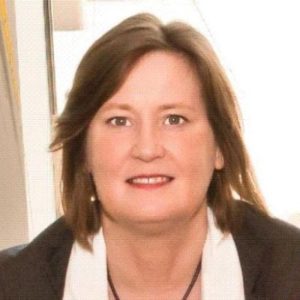 Dr. Wendy J. Nilsen, Acting Deputy Division Director, Information and Intelligent Systems, Computer & Information Science & Engineering Directorate, NSF, USA
Dr. Wendy J. Nilsen, Acting Deputy Division Director, Information and Intelligent Systems, Computer & Information Science & Engineering Directorate, NSF, USA
Bio-sketch: Wendy Nilsen, Ph.D. is the Acting Deputy Division Director in the Information and Intelligent Systems Division of the Computer and Information Science and Engineering Directorate at NSF. She is also the lead Program Director in the Smart Health program. Her work has focused on the intersection of computing and human functioning. Her interests span the areas of sensing, analytics, cyber-physical systems, information systems, machine learning, artificial intelligence, and robotics. She also serves as co-chair of the Health Information Technology Research and Development working group of the Networking and Information Technology Research and Development Program and, serving on numerous federal technology initiatives. Prior to joining NSF, Wendy was at the National Institutes of Health.
Diversity and Inclusion • 6 October 2021 • 12 – 1:15 PM ET
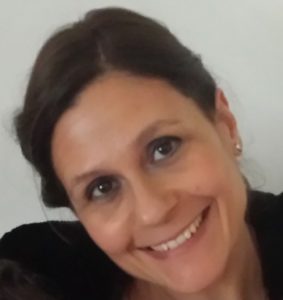 Dr. Barbara Di Camillo, Full Professor in Computer Science, Department of Information Engineering, University of Padova
Dr. Barbara Di Camillo, Full Professor in Computer Science, Department of Information Engineering, University of Padova
Talk Title: Facing COVID Health Disparities in Health Care of ALS and MS Patients: The BRAINTEASER Experience
Bio-sketch: Barbara Di Camillo is a Fulltime Professor in Computer Science at the Department of Information Engineering, University of Padova. She received her Master’s Degree in Electronic Engineering in the year 2000, at the University of Padova. She was a visiting scientist at Mayo Clinic (Rochester, MN, USA), “endocrinology research group” leaded by Dr. S. Nair, in 2002 and at the “Bioinformatics Center of University of Technology of Graz” (Graz, Austria), lead by Prof. Trajanoski in 2003. In 2004 she received a Ph.D. in Biomedical Engineering from the University of Padova. Her research activity is centered on the development and application of advanced modeling, data mining, and machine learning methods for high-throughput biological data analysis in the field of bioinformatics and predictive modeling in medicine. She also has expertise in biological network inference using differential equation-based models, Boolean and Bayesian Networks for deterministic and stochastic modeling of disease progression, transcriptional networks, and signaling pathways. She has been PI and WP leader of projects funded by the EU, Italy, and industry and has received numerous awards in particular in the field of reverse-engineering and machine learning applied to clinical and biological data.
 Dr. Arianna Dagliati, Assistant Professor, Department of Industrial and Information Engineering, The University of Pavia, Italy; AIME (Society of AI in Medicine) Board Member
Dr. Arianna Dagliati, Assistant Professor, Department of Industrial and Information Engineering, The University of Pavia, Italy; AIME (Society of AI in Medicine) Board Member
Talk Title: International EHR data to Conduct Collaborative COVID-19 Research: is Health Informatics Inclusive by Design?
Bio-sketch: Arianna Dagliati is an Assistant Professor near the Department of industrial and information engineering, The University of Pavia (Italy). She is part of the 4CE international consortium for electronic health record data-driven studies of the COVID-19 pandemic and was appointed as AIME (society of AI in medicine) Board Member. Her research is dedicated to the development of mining approaches for enabling the recognition of temporal patterns and electronic phenotypes in longitudinal clinical data. Her commitment is to align her work to global translational medicine research priorities, embrace key steps for providing direct impact of machine learning and artificial intelligence in clinical practice: from software tools that link clinical knowledge with machine learning-based evidence from longitudinal data, to modeling approaches to identify critical transitions in patient’s histories. She has an extensive history of working in multidisciplinary teams and collaborated with a broad range of administrative, specialist, and generalist clinicians, and public health professionals, to deliver scientific findings and to integrate algorithms in clinical decision support systems.
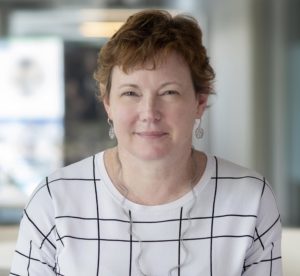 Dr. Elizabeth Mynatt, Regents’ and Distinguished Professor in the College of Computing, the Executive Director of Institute for People and Technology, Georgia Institute of Technology, USA
Dr. Elizabeth Mynatt, Regents’ and Distinguished Professor in the College of Computing, the Executive Director of Institute for People and Technology, Georgia Institute of Technology, USA
Talk Title: Combatting Health Disparities By Supporting Community-Led Covid Response for Underserved Populations
Abstract: Facing a once-in-a-century pandemic, closures and safe distancing orders swept much of the United States due to the COVID-19 pandemic. Activities that were previously conducted face-to-face, in education, healthcare, commerce, and more, were either deferred or re-imagined as communities determined how to respond to the pandemic. For the past year, we have focused our attention on vulnerable and underserved populations by inventing and informing services to minimize program interruptions, by developing strategies to reduce disparities in COVID-19 testing, treatment, and vaccine uptake, and by chronicling the lived experience of the pandemic in these communities. In this research, we have sought to understand the potential for health informatics to combat health disparities by empowering community-led approaches.
Bio-sketch: Dr. Elizabeth Mynatt is a Regents’ and Distinguished Professor in the College of Computing and the Executive Director of Georgia Tech’s Institute for People and Technology that pursues innovative research to promote healthy, productive, and fulfilling lives on a global scale. Over the past two decades, Mynatt’s research has focused on the role of ubiquitous computing in health, including creating the NCI-funded MyPath mobile application that provides breast cancer patients with personalized recommendations during their cancer journey. Mynatt co-leads the Emory-Georgia Tech program to empower people with mild cognitive impairment (MCI). She is also one of the principal researchers directing the NSF AI Institute for Collaborative Assistance and Responsive Interaction for Networked Groups (AI-CARING)and past director of the Aware Home Research Initiative; investigating the design of interactive intelligent systems, especially those that enable older adults to continue living independently as opposed to moving to an institutional care setting. Mynatt has been recognized as an ACM Fellow, a member of the SIGCHI Academy, and a Sloan and Kavli research fellow. She has published more than 100 scientific papers and chaired the CHI 2010 conference, the premier international conference in human-computer interaction. Prior to joining the Georgia Tech faculty in 1998, Mynatt was a member of the research staff at Xerox PARC.
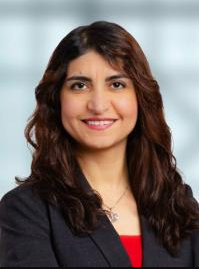 Dr. Azadeh Yadollahi, Assistant Professor at the prestigious Institute of Biomaterials and Biomedical Engineering at the University of Toronto
Dr. Azadeh Yadollahi, Assistant Professor at the prestigious Institute of Biomaterials and Biomedical Engineering at the University of Toronto
Talk Title: The Lingering Effects of COVID on Women in Academia and Research
Bio-sketch:
Dr. Azadeh Yadollahi holds a Canada Research Chair-Tier 2 in Cardio-Respiratory Engineering, is a Senior Scientist at the University Health Network’s KITE research institute (UHN-KITE), an Associate Professor at the University of Toronto’s Institute of Biomedical Engineering, and an adjunct faculty at the University of Manitoba. Dr. Yadollahi is a strong advocate of inclusion, diversity, equity, and accessibility (IDEA), and chairs UHN Research’s IDEA committee. Her research aims to improve understanding of the pathophysiology of cardio-respiratory disorders during sleep, and to develop novel technologies for improved management of these disorders. She is particularly interested in developing innovative technologies for monitoring of physiological signals at home and implementing personalized treatments for individuals with chronic cardio-respiratory disorders.
At UHN-KITE, Dr. Yadollahi leads the SleepdB laboratory. SleepdB is one of the few facilities in Canada dedicated to examining the intricate interplay between sleep, hemodynamics and cardio-respiratory disorders. SleepdB has gold standard clinical equipment to assess sleep and cardio-respiratory function. Moreover, through special infrastructure that enables full control of lighting and acoustics, SleepdB can realistically simulate home or in-hospital environments for technology development and validation. To date, Dr. Yadollahi has authored and co-authored more than 50 peer-reviewed manuscripts, presented over 100 times in scientific conferences, filed 3 patents, and been invited to give 46 talks on her research at prominent national and international academic institutions.
Clinical Translation • 7 October 2021 • 12 – 1:15 PM ET
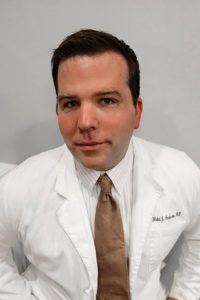 Dr. Blake Anderson, Chief Health Information Officer Atlanta VA Medical Center; Assistant Professor of Medicine, Emory University School of Medicine; Division of General Medicine and Geriatrics, Primary Care Section, USA
Dr. Blake Anderson, Chief Health Information Officer Atlanta VA Medical Center; Assistant Professor of Medicine, Emory University School of Medicine; Division of General Medicine and Geriatrics, Primary Care Section, USA
Talk Title: Automation and Machine Learning to Improve COVID-19 Management and Outcomes
Abstract: At the advent of the COVID-19 pandemic we quickly realized that additional technological innovations would be needed to maintain the large volume of patients who would be needing remote care for acute COVID-19. Staffing shortages compounded the problem. Monoclonal antibody therapy (mAb) emerged as an effect that could improve outcomes in COVID-19 outpatients but identifying patients most likely to benefit required significant human resources. Daily symptom tracking surveys using Tonic text message surveys and telemedicine consultations were offered to all patients who tested positive for SARS-CoV-2. Survey participants with alarm responses were contacted by a nurse after an automated message was generated and sent to a nurse message pool. Automated risk score assessments using both rule-based methods and machine learning methods with XGBoost were deployed to a live data dashboard, which incorporated the patient-reported vital signs and symptoms. This included an automated recommendation for mAb treatment. We found patients who utilized RPM messages were less likely to require an emergency department visit or hospital admission. Although we suspect unmeasured confounding contributed to these results, we believe this system to at least be non-inferior to daily phone call contact. The automated rule-based EUA criteria system for mAb was used by our nurse results team to help identify patients most likely to benefit from the treatment. We were unable to assess the impact of the machine learning risk score assessment that was deployed onto our live data dashboard. Automated risk assessment systems using rule-based or machine learning algorithms that incorporate patient responses remotely offer a novel approach to improve patient care, but the deployment of the model into a location that doesn’t disrupt physician or other provider workflow is essential as is choosing an outcome where a clinical intervention that could improve a patient’s course is possible.
Bio-sketch: Dr. Blake Anderson is an Assistant Professor of Medicine at Emory University School of Medicine and will soon be assuming the position of Chief Health Information Officer at the Atlanta Veterans Affairs Medical Center. He received his medical doctorate from Emory University in 2011. He completed 1 year of residency training in general surgery at the University of Florida in 2012 before completing a residency in internal medicine at Emory University in 2015 and then completing a Chief Resident in Quality and Patient Safety in 2016. His research focuses on use of clinical data sources to improve patient outcomes with a special interest in automation and machine learning. In addition to working clinically in an acute COVID-19 treatment center for Emory, he has developed and led Emory’s COVID-19 Home Recovery Program and Emory’s COVID-19 Remote Patient Monitoring Program. He has developed an auto-triage system for patients who complete self-reported symptom and vital sign surveys. He also has developed machine learning-derived algorithms to identify patients at the highest risk for acute decompensation following infection with COVID-19. Currently, he is investigating the possibility of incorporating remotely obtained physiologic parameters including photoplethysmography in addition to data from free-text notes into his predictive models.
 Dr. Siva Bhavani, Assistant Professor of Medicine in the Division of Pulmonary and Critical Care at Emory University, USA
Dr. Siva Bhavani, Assistant Professor of Medicine in the Division of Pulmonary and Critical Care at Emory University, USA
Biosketch: Dr. Siva Bhavani is a Pulmonary and Critical Care physician and data scientist with expertise in applying machine learning to discover precision medicine approaches to manage ICU patients. Siva received his MD from University of Texas Medical Branch and completed an Internal Medicine residency at Baylor College of Medicine. He then specialized in Pulmonary and Critical Care at University of Chicago. Siva’s research training included an MS in Public Health Sciences and a post-doctoral T32 fellowship at University of Chicago. His research over the past 5 years has focused on using unsupervised longitudinal clustering algorithms to identify distinct body temperature responses to infections. The resulting temperature trajectory algorithm has garnered widespread interest with first-author publications in the highest impact-factor critical care journals in the US (American Journal of Respiratory and Critical Care Medicine, Critical Care Medicine, and CHEST). Siva was awarded a grant from the American Thoracic Society to apply this temperature trajectory work to patients with COVID-19. Siva is also the recipient of an NIH Early Career Development Award to expand his work beyond temperature to include multidimensional longitudinal EHR data.![]()
 Dr. Scott Campbell, President, San Francisco Emergency Physicians Association; Founder, Zero Hour Medical, USA
Dr. Scott Campbell, President, San Francisco Emergency Physicians Association; Founder, Zero Hour Medical, USA
Talk Title: AI vs Covid-19 and Why This Matters
Abstract: Predicting the evolutionary course of a pandemic is difficult, particularly due to the lack of availability of reliable near real-time data. Unquestionably, Covid-19 caught emergency physicians, preparedness providers, and leaders in San Francisco flat-footed in January of 2020. With varying degrees of success, however, the SFEPA (San Francisco Emergency Physicians Association) rallied hospital-based physicians across the city with the tools we had at hand, such as weekly 60 minute, physician only, “All hands on decks check-ins” with providers from every hospital in the city; tech solution innovations (3d printing of face shields); and backchannel break-the-glass “What’s apps” for extreme crisis contingencies, “Hospital X needs PPE…NOW”. Sadly, scalable AI and machine learning had no real active role in the management of the pandemic in the City of San Francisco as “knowing Ai, wanting Ai, and modeling Ai are not the same as deploying Ai”. We will discuss the reasons and barriers to Ai implementation we have encountered, and more hopefully, the important role of AI moving forward. We will also discuss the 5 S’s of disaster preparedness and response (Stuff, Space, Staff, Systems, Situational Awareness) and how AI can be leveraged for future planning in each of these areas. Finally, we describe some of our current AI projects and how they fit into this model and hopefully point to a brighter future for disaster preparedness, including the role of the electrical engineering community involvement around the globe
Bio-Sketch: Dr. Scott Campbell earned a BA in Political Science from the University of Michigan where he was a member of the varsity baseball team. He received his MPH from the UCLA School of Public Health with a dual concentration in behavioral science and health education, and his MD from Columbia University College of Physicians and Surgeons. He began his medical career in the specialty of internal medicine, transplant, and cardiopulmonary critical care at California Pacific Medical Center in San Francisco before transitioning to emergency medicine where he has been an attending emergency physician for The Permanente Medical Group of Northern California for over thirty years with most of that practice at the Kaiser San Francisco Medical Center. Scott has served a broad range of local, state, national, and public-private health policy planning efforts in the United States, the United Kingdom, and Canada focusing on focusing on patient throughput optimization and creative capacity carve-outs across multiple care delivery continuums. On behalf of Mayor Gavin Newsom, he led innovative teams to address emergency department overcrowding in San Francisco with solutions such as the SF McMillan Sobering, Medical Respite and Dore Psychiatric Centers, creation of a 311-call system, and updated 911 call triage processes as well as partnering with McKinsey & Co. as Chairman of the SF Ambulance Diversion Task Force. Extensive emergency medicine leadership, analytic and epidemic modeling experience in the Covid-19 pandemic while serving as president of the San Francisco Emergency Physician’s Association inspired Scott to form the consulting service, Zero Hour Medical, blending his passion for Ai and machine learning with problem-solving in emergency medicine, disaster preparedness, and acute care situational awareness for payers, providers, enterprise leadership, and early-stage ventures.
